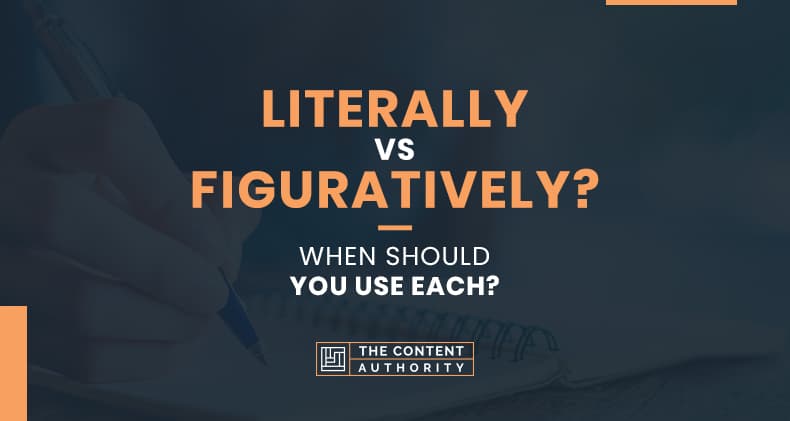The terms “literally” and “figuratively” have different spellings, unique pronunciations, and dissimilar meanings. Despite these clear discrepancies, some people tend to confuse between the two or use them interchangeably. Though such errors get overlooked quite often, they are still incorrect and must be addressed/rectified.
“Literally” describes a thing in the truest sense of the word. If someone says, “I was literally blown away by the wind”, it means the gust of wind, albeit momentarily, caused indentations in their face for real. To say, “I was figuratively blown away by the performance”, however, is incorrect.
Keep reading to take a deep dive into the meanings of the two words, how they get used in different sentences and contexts, and lots more.

“Literally” – Definition
The term “literally” denotes anything that “actually happened”. When something is described figuratively, it means a language or set of words, which actually describe something else, has been used to express another thought altogether. That isn’t the case with “literally”, however. Unlike “figuratively”, it’s completely devoid of metaphors or other figures of speech.
“Literally” was first documented as a word during the early 1500s. However, during the 19th century, the word’s meaning evolved and was used to “intensify” the context of a text, which doesn’t comply with its meaning “without exaggeration”. And this has been the case ever since the alteration in meaning happened and got normalized.
“Figuratively” – Definition
“Figuratively” means things in a symbolic or analogous way. It is the adverb of “figurative”, the adjective that means “involving an expression or figure of speech”. The word has an “imaginative” connotation, which means something that did not really happen. Some of the terms synonymous with “figuratively” include “allegorically”, “metaphorically”, “emblematically”, etc.
The word is derived from “figūrātīvus”, a Late Latin term. “Figūrātīvus” became “figurative” during the Middle English era before it finally assumed its current spelling. The term “figuratively” can also refer to things represented by a drawing, figure, emblem, or sculpture. This alternate meaning is where the adverb gets a bit mixed up with “literally”.
Using the Term “Literally” in Texts
As mentioned above, the word “literally” describes things black-and-white. When used in a sentence, the term leaves no room for inaccuracy, exaggeration, or imagination. It’s used to describe things the way they are. Therefore, the word should be incorporated in sentences correctly, or unnecessary hyperboles shouldn’t be used if the word “literally” is being used in the text or the intent is to communicate what actually happened.
For example, the expression “blow one’s brains out” is metaphoric in its meaning. Therefore, saying, “It literally blew my brain out”, would be both logically and grammatically wrong because that would mean your brain actually popped out of your head. If you have basic knowledge about human physiology, you’d know the brain doesn’t work like that.
As mentioned above, the term “literally” is now commonly used as an “intensifier”. For example:
- She literally threw stones at him.
The problem with using “literally” in the above sentence is it’s “redundant” or throws off the sentence’s precision. The sentence above would read fine or have its intended message intact and devoid of “exaggeration” if “literally” was taken out.
The Mix-Up Between “Literally” and “Figuratively”
Though the word “literally” means “exactly” or “actually”, it incorrectly gets used in sentences or contexts where “figuratively” would have been appropriate. For example:
- But those discoveries also led them to literally a tsunami of information.
Quite obviously, there was no actual “data tsunami” that took place, as the writer/speaker inadvertently puts it. But because it has become common to use “literally” in texts, the above sentence doesn’t read that bad.
This subtle push to use “literally” and “figuratively” interchangeably is not deliberate but real. But because both the adverbs have their somewhat unique definitions, neither is likely to get eclipsed by the other.
Most Readers are Quite Smart
Even if you happen to use “literally” in place of “figuratively” or use it despite the option to not use it at all, most people will not misinterpret or misconstrue your texts. This tacit understanding of context among readers, to a great extent, can be attributed to the aforementioned overlapping that quite commonly takes place between “literally” and “figuratively”.
In other words, people have grown so accustomed to seeing “literally” being used in contexts where it should not have been used, and they do not always take its usage “literally” (no pun intended).
From the above sentence that talks about a “data tsunami”, readers are highly unlikely to assume an actual tsunami of information, even though the term “literally” was used in the sentence.
Here are a few more sentences that incorrectly use the term “literally”, but they still are not at the peril of being misinterpreted:
- She literally died laughing.
- When he saw his results, he literally died of shame.
Sentences using the adverb “literally” are quite common in regular conversations and speeches. However, in formal writing pieces – such as news articles, school papers, professional journals, etc. – such texts are not accepted.
Even if you’re not writing for a formal publication, it’s recommended to use “literally” only if you truly feel the word adds value or meaning to a sentence in some way. Do not use it loosely or as an “intensifier”.

Using the Word “Figuratively” in Writings
The word “figuratively” is used in texts to categorically state the context of a given text or used in sentences that do not depict reality. When the word is not used, and the goal is still to describe things in an imaginary way, a figure of speech could be employed, such as a metaphor, hyperbole, simile, or personification.
Some common words could have literal and figurative meanings, and they can be employed in sentences for either of those dual meanings. For example, the term “chair” has more than one meaning. When used literally, it denotes a piece of furniture used in homes and at offices. When employed figuratively, however, it could refer to “the head of a company”.
Unlike “literally, the term “figuratively” is not frequently used in sentences. Often, the symbolic meaning is implied or understood. For example:
- She was firing on all cylinders.
The above sentence communicates the person was doing a fantastic job of whatever she was up to. Therefore, it’s highly unlikely for readers to misconstrue the sentence or believe the person was “actually firing”.
The metaphoric meaning is understood despite “figuratively” not being used in the sentence. Inserting the term “figuratively” in the sentence would have only made the text read awkwardly.
Most classic poems and other pieces of literature are highly symbolic. They manage to accomplish that without using terms such as “figuratively”, “metaphorically”, “allegorically”, etc. in texts explicitly.
Example Sentences with the Word “Literally”
Here is a list of sentences that use the word “literally” correctly. The context or premises of some of the sentences may sound a bit too far-fetched or away from reality, but those are certainly possible.
- The protesters literally occupied the entire street.
- People can literally get drowned in their body fluids.
- Although I do not know sports completely, I can tell you literally everything that happened during yesterday’s match.
- I literally spent every dollar I had in my savings to buy that new gaming console.
- She did a literal translation of the essay.
- I hope he doesn’t take my advice literally.
- I am so hungry I can literally eat the entire chicken in a minute.
- Did she mean that literally?
- He was literally near the end of his rope.
- They slept together, and literally, nothing happened between the two the entire night.
Example Sentences with the Term “Figuratively”
The following is a list of sentences that incorporate the term “figuratively” or “figurative” correctly:
- Figuratively speaking, the two are sailing the same boat.
- He broke the figurative roof that was holding him back.
- Figuratively, the country is at the center of some major reforms in the continent.
- The word was used in the given context figuratively.
- The atoms that the bimolecular reaction system is composed of is described figuratively.
- When she was talking about chopping off his head, she meant that figuratively.
The following are sentences that do not employ the term “figuratively” despite being “figurative” in their intended meanings:
- She bumped into him in the library. (She met him accidentally)
- The game is a do-or-die match for the Lakers. (If the Lakers lose, they’re out of the competition)
- I told her a thousand times not to sprint after breakfast. (No one can reiterate anything a thousand times, or even a hundred times)
- They are hungry for some adrenaline rush. (Adrenaline rush is not something you can eat)
- She kept Billy in the dark the entire time. (She did not tell him the truth)
Conclusion
To conclude, “literally” and “figuratively” are two different terms. You can open a box “literally” but not “figuratively”. Similarly, stress causes you to explode “figuratively”, not “literally”. Therefore, tread with caution when using these words in your texts. The last thing you would want is to throw around these words carelessly in your prose, only to find the meanings of your texts fully upended.
Shawn Manaher is the founder and CEO of The Content Authority. He’s one part content manager, one part writing ninja organizer, and two parts leader of top content creators. You don’t even want to know what he calls pancakes.


